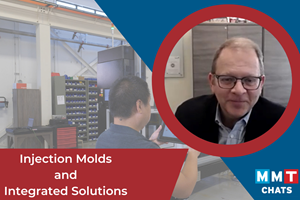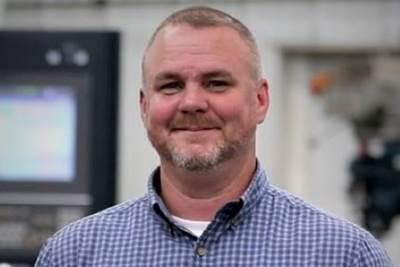
Gabe English, MMT EAB member and president of Western Carolina Tool & Mold shares his top article picks. Source | Western Carolina Tool & Mold
Gabe English is the president of Western Carolina Tool & Mold in Mills River, North Carolina, a full-service tool and mold shop, offering mold design and manufacturing, engineering changes, mold repair with reverse engineering, as well as TIG welding, precision laser welding, and laser marking and engraving. The company offers complete capabilities to design, build, maintain and repair molds, related tooling and specialized equipment from concept to final product.
With over two decades in the moldmaking industry, Gabe has extensive experience in tool design, manufacturing and business leadership. He continues this year’s EAB series by sharing his five favorite MoldMaking Technology articles over the past year and key takeaways that have been valuable to his work.
1 Three Technologies to Help Fill the Skills Gap
Moldmakers can address the labor challenge with robotic systems, simulation products and metal 3D printers.
Many small mold builders are aware that the skilled labor shortage is a significant challenge. Over the past few years, I have been researching and implementing robotics in our shop. Recently, we added a five-axis graphite mill, and we are on track to integrate a 3R robot with it this year.
Until now, 3D metal printing seemed out of reach due to cost and practicality. However, in the past year, I reached out to a couple of suppliers about this technology and discovered that there are affordable options available, such as Xact Metal. We are currently collaborating with some of our key customers on projects that would be suitable for 3D metal printing, and we hope to have a system in-house within the next few years.
2 How to Implement Five-Axis Mold Machining for Higher
Productivity, Versatility
Understanding the basics of five-axis capabilities justifies the investment, but exploring all the multi-axis machine benefits and approaches enhances the return on investment.
I began planning to replace our older three-axis graphite mill in 2023. The main debate was whether a five-axis mill was unnecessary or essential. The article's explanations of efficiency gains, ROI opportunities, and versatility were very insightful. We added our five-axis mill in January, and now we truly recognize the need for another one dedicated to working with steel.
3 Scholarship, Grant Funding Available from SPE Mold Technologies Division
There’s no better time to discuss the scholarships and grants available to support education in plastics and moldmaking.
One of the challenges of operating a mold shop in Western North Carolina is that the area is primarily service-oriented, resulting in minimal skilled labor and technical training available. To address this issue, we have initiated several donations and partnerships with local educational institutions, including elementary schools, high schools, and colleges.
Until I read a recent article, I was unaware that the Society of Plastics Engineers (SPE) offers grants for both students and educational facilities. In 2023, I was honored to receive the SPE Moldmaker of the Year award, and I decided to donate the award (sponsored by Hasco) to Western Carolina University in Cullowhee, NC. I was able to connect WCU with SPE, and they are now actively pursuing available grants.
4 Overcoming Barriers to Automation Integration in Precision Moldmaking
It’s easy to imagine the advantages automation offers the moldmaking process, but it's challenging to change one’s mindset, develop a plan and invest.
This article was a valuable resource as we plan to automate our latest five-axis machine. In the section addressing integration challenges, it discusses the benefits of processing smaller inserts individually rather than grouping them in bars as we typically do. This has changed my perspective on purchasing a small Workpal to load only the mill. Now, I'm considering the larger Workpartner and moving my newest EDM sinker to take advantage of the automation for that machine as well.
5 Reasons to Use Fiber Lasers for Mold Cleaning
Fiber lasers offer simplicity, speed, control and portability, minimizing mold cleaning risks.
A significant part of our work involves repairing and completely refurbishing older molds. We have several customers who mold PVC, and one of the biggest challenges is the time-consuming task of removing rust and grime from the exterior surfaces of plates and components. Additionally, there's often a mess left behind from the dust in the shop. This is an issue I haven't addressed yet, but it is on my radar for the future.
Related Content
Overcoming Pain Points in Moldmaking with AI
Shops that embrace AI as a tool, not a threat, can enhance efficiency, preserve expertise, and attract tech-savvy talent.
Read MoreMMT Chats: Injection Molds and Integrated Solutions Through Ambition and Innovation
Jordan Robertson, VP, Business Development and Marketing for StackTeck discusses various mold technologies to improve efficiencies in automation, cooling, lightweighting and sustainability.
Read MoreAchieving Flexible Capacity with Automation
This high-mix, low-volume manufacturer embarked on a year and a half program to introduce robotics to its manufacturing process.
Read MoreDynamic Tool Corporation – Creating the Team to Move Moldmaking Into the Future
For 40+ years, Dynamic Tool Corp. has offered precision tooling, emphasizing education, mentoring and innovation. The company is committed to excellence, integrity, safety and customer service, as well as inspiring growth and quality in manufacturing.
Read MoreRead Next
MMT Chats: Award-Winning 2024 Mold Maker of the Year
Gabe English of Western Carolina Tool & Mold received the Society of Plastics Engineers (SPE) Mold Technologies Div. (MTD) Mold Maker of the Year award.
Read MoreEditorial Advisory Board 2023-2026: Meet New Board Member Gabe English, Western Carolina Tool & Mold
The 2023-2026 version of MoldMaking Technology's EAB features a new crew of industry professionals. Meet Gabe English
Read MoreMMT Chats: Resilience Through Relationships After a Hurricane
A mold builder’s story of resilience, teamwork and growth after Hurricane Helene devastated their community.
Read More























